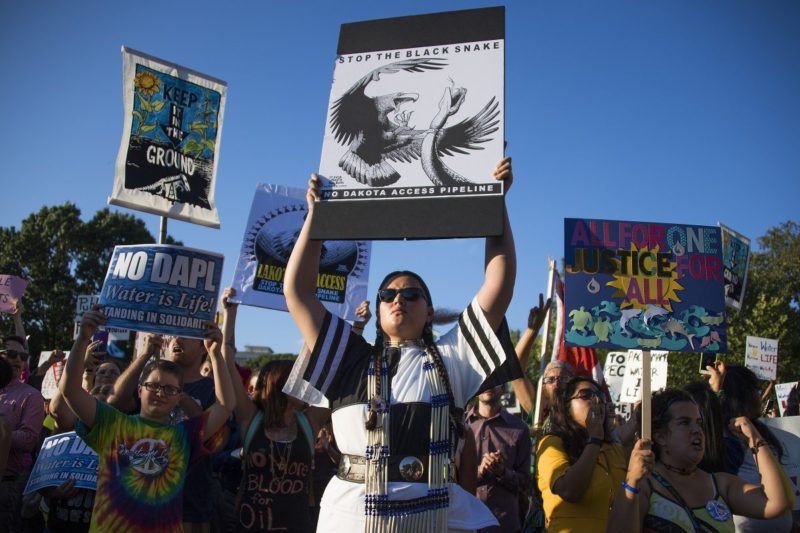At Standing Rock, Environmental Justice Is Reproductive Justice
As indigenous women, we deserve a future free from fears of our tap water, a future where we are free to raise our families the best way we know how on our ancestral land.

On the Standing Rock Sioux Reservation, water and land are being threatened by the proposed Dakota Access pipeline, which would carry almost 500,000 barrels of oil per day. Fears of the pipes bursting and affecting the land are not unfounded; sacred sites, such as burial grounds, have already been desecrated during the pipeline’s construction.
What many non-Natives don’t realize is that indigenous people’s ties to the land and water are directly connected to our bodies, even though all tribal communities are different. And for women, these ties are even stronger.
I grew up in Laguna, New Mexico, land of my father and our Pueblo ancestors. Some of our sacred songs are about hunting at Mt. Taylor. It is this history and what we have left of our language that propelled us, along with other Pueblo communities, to fight against the State of New Mexico when our access to Mt. Taylor was threatened by outside interests. And this is one of many issues that compels New Mexico’s indigenous communities to stand in solidarity with Standing Rock.
My identity and experiences as an indigenous woman and mother inform my perspectives on how strong the connection between our traditions and our environment really is.
My mother is a Mescalero Apache and Xicana woman. Because we are Apache, I had my August 2005 puberty ceremony in Mescalero. It was one of the most fulfilling things I have ever done for myself and the greatest gift my parents have ever given me. This puberty ceremony requires at least a year of preparation, and it is an emotionally and physically demanding event. This ceremony is four days, but we are required to prepare four days before and four days afterward.
Having this ceremony, which generations of young women before me have had, made me question why, when I went back to my mostly white high school, the topic of periods was usually followed by “Gross!” I had just celebrated getting my period, and I was being told how strong and sacred I am, like White Painted Woman. My peers shrugged off my discomfort with their “Pocahottie” costumes, but no Natives I grew up with sexualize traditional attire and the costumes were nowhere near accurate. As I got older, I started to realize that the way women’s bodies—more specifically, indigenous women’s bodies—were talked about or represented directly affects how our bodies are treated.
This realization is part of a long history of exploitation and violence since settlers came to Turtle Island: the rape and murders of indigenous women; the almost complete decimation of an entire group of people; and for many tribal communities, removal from ancestral lands.
From involuntary sterilization to having our babies forcibly taken from our homes to boarding schools, indigenous women have had our bodily autonomy taken from us in many ways. In virtually every indigenous community, women are sacred and respected because we bring and sustain life. We hold families together.
But without land to literally house our families, how can we lead our communities? Without water, how can we sustain our own lives and secure a future for our children and their families? These are the questions mamas and grandmothers are asking in Standing Rock right now. Indigenous communities have always been resilient in the face of danger, but resilience is more important now than ever.
Indigenous people whose water has been contaminated and land has been mined have experienced pregnancy losses, pregnancy complications, children born with disabilities, and gender-based violence. In a part of the Navajo Nation where many mines are located, childhood reproductive cancers have occurred at rates 17 times higher than in the United States as a whole. Women go missing in Farmington, New Mexico, where many oil workers stay while working, and their disappearances are heartbreakingly normalized.
Our lands are not just reservations. They are literally what supports our families. In almost every indigenous community, our women and some two-spirit people are the caretakers of the land. What we put into our bodies directly affects our pregnancies and our general well-being.
Standing Rock’s strong and well-founded opposition to this dangerous pipeline is not just an issue of tribal sovereignty not being respected by private entities and state governments, nor just an issue of environmental justice. This is also an issue of reproductive justice. As indigenous women, we deserve a future free from fears of our tap water and free to raise our families the best way we know how on our ancestral land.
